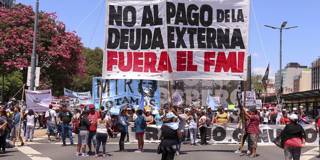By affirming that Argentina's public-sector debt is unsustainable, the International Monetary Fund has taken a critical step toward resolving the country's long-running crisis. Moving forward, one hopes that the Fund will realize its own role in the latest crisis and follow its own advice on when to pursue capital-market liberalization.
NEW YORK – Argentina has just passed a critical juncture with respect to its debt. The International Monetary Fund’s mission to the country has affirmed that the public-sector debt is unsustainable, as President Alberto Fernández and his minister of the economy, Martin Guzmán, a debt expert, have been pointing out. According to the IMF, “The primary surplus that would be needed to reduce public debt and gross financing needs to levels consistent with manageable rollover risk and satisfactory potential growth is not economically nor politically feasible.”
The current state of affairs reflects the massive accumulation of debt under former President Mauricio Macri’s administration, which increased the central government debt from $241 billion to $321 billion during its first two years. That build-up was accompanied by a strong appreciation of the peso but only weak economic growth. It was soon followed by a recession, high inflation, and sharp currency depreciation. Owing to this combination of increased debt and a sharp fall in the dollar value of GDP, Argentina’s central government debt ratio skyrocketed to over 90% of GDP in 2019.
The current debt crisis also reflects a broader loss of confidence among both external creditors and domestic agents. Over the past two years, this crisis of confidence has caused a sudden stop in external financing and almost $50 billion in capital flight. That figure is not far off from the $44 billion that the country has drawn from the $50 billion IMF loan that the Fund approved in June 2018 and raised to $57 billion the following September.

NEW YORK – Argentina has just passed a critical juncture with respect to its debt. The International Monetary Fund’s mission to the country has affirmed that the public-sector debt is unsustainable, as President Alberto Fernández and his minister of the economy, Martin Guzmán, a debt expert, have been pointing out. According to the IMF, “The primary surplus that would be needed to reduce public debt and gross financing needs to levels consistent with manageable rollover risk and satisfactory potential growth is not economically nor politically feasible.”
The current state of affairs reflects the massive accumulation of debt under former President Mauricio Macri’s administration, which increased the central government debt from $241 billion to $321 billion during its first two years. That build-up was accompanied by a strong appreciation of the peso but only weak economic growth. It was soon followed by a recession, high inflation, and sharp currency depreciation. Owing to this combination of increased debt and a sharp fall in the dollar value of GDP, Argentina’s central government debt ratio skyrocketed to over 90% of GDP in 2019.
The current debt crisis also reflects a broader loss of confidence among both external creditors and domestic agents. Over the past two years, this crisis of confidence has caused a sudden stop in external financing and almost $50 billion in capital flight. That figure is not far off from the $44 billion that the country has drawn from the $50 billion IMF loan that the Fund approved in June 2018 and raised to $57 billion the following September.